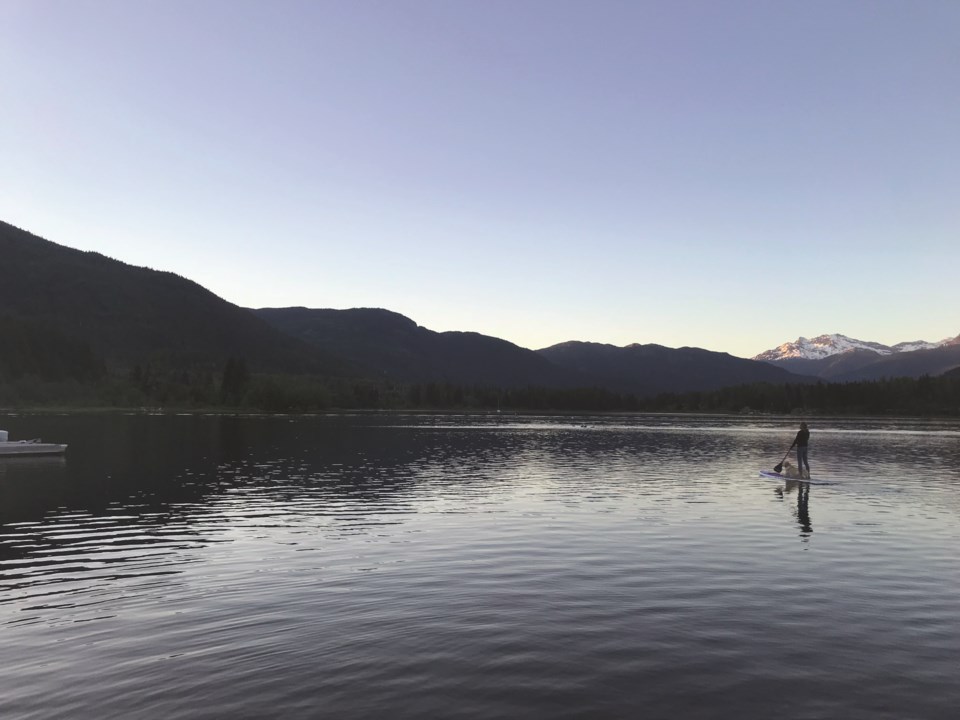Tucked away on the shores of Alta Lake, between palatial modern homes, is Lynn Kriwoken’s family cabin.
Her husband Greg’s grandfather—a contemporary of early Whistler pioneers, Myrtle and Alex Philip—purchased the property 82 years ago and, since then, four generations of the family have spent time on the lake.
“I’ve been going up for 40 years,” Kriwoken said. “Greg Farley, my husband, his grandfather bought a place in the early ’40s and he’s been coming up there since he was a little guy. He’s old friends with David Fairhurst. HIs father [Dick Fairhurst] built the lodge up there now that is The Point [Artist- Run Centre]. You put those two together and they notice huge changes in the fishing and lake quality. And, in more recent years, not just residents around the lake, but visitors have noticed changes in not only the lake environment, but [the] lake experience, too: noise pollution, more boats, shoreline erosion, attributed in some cases to boating, improper dock construction.”
That was part of Kriwoken’s motivation for joining the Whistler Lakes Conservation Association (WLCA) after it first formed in 2020. Retired from a 35-year career working with the province in water management, she now serves as the organization’s president and program coordinator. In late January, she received an outstanding volunteer acknowledgement from the BC Lake Stewardship Society (BCLSS).
In a huge win, that organization also named the WLCA its volunteer of the year.
“It all goes to the volunteers,” Kriwoken said. “The Whistler Lakes Conservation Association is the larger group honoured for this award—it’s humbling and inspiring. There are a lot of groups around the province making a difference with lake health and we were granted one of two awards—that’s special.”
In a release, the BCLSS listed the group’s achievements on Alta, Alpha, Nita, Green and Lost lakes, in just over two years. There’s education to the public, a fall lake clean- up, and, perhaps most time consuming, lake monitoring—which involves collecting data on temperature, water clarity and dissolved oxygen profiles. The organization also hosted training to teach locals how to take samples and assess the ecology of the lakes.
“The BCLSS is grateful to work with such an enthusiastic group of volunteers and we are excited to see what future initiatives WLCA takes on,” it said in the release. “Their dedication to the water monitoring program
and to promoting substantial practices around the Whistler lakes is inspiring and encouraging.”
For lake monitoring, that means volunteers—who do not need a scientific background, but do receive training—go out on a Whistler lake every two weeks, rain or shine, for six months of the year to take measurements.
“It all comes down to volunteers,” Kriwoken said. “Having partners like the lake stewardship society, and the Whistler Blackcomb Foundation, the municipality, B.C. Ministry of Environment, the Squamish Lil’wat Cultural Centre, they all provide us with training, financial, technical support, and education. But, at the end of the day, it’s 12 people who get in a boat or kayak or dinghy, and get on the lake to do their metrics or measurements.”
To that end, the organization is always looking for more volunteers.
“It’s been really rewarding watching this whole wave of citizen science,” Kriwoken said. “It’s a phenomenon happening around the province, but also the world. Fundamentally, people have concerns about the environment in which they live and they want to do something to help.




